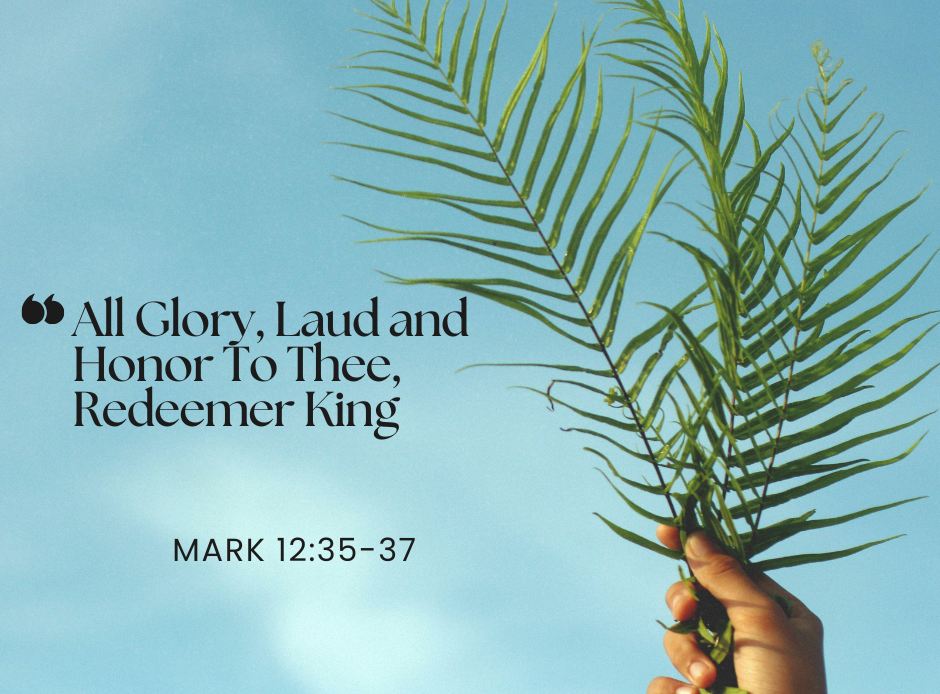
“All Glory, Laud and Honor”
Back in my youth ministry days, a great icebreaker—and a fun way to kill time during some downtime—was to toss out a riddle, a brain teaser, or occasionally spark a debate with a ridiculous question. Some of my favorites were “Is water wet?” and “Is a hotdog a sandwich?” These are silly, lighthearted questions that masquerade as riddles because they don’t really have a definitive answer. It’s almost impossible for anyone to “win” the argument. The best you can do is stand on the popular opinion of the room.
The other day, I read Mark 12:35–37, where Jesus presents an interesting riddle to those in the temple:
35 And as Jesus taught in the temple, he said, “How can the scribes say that the Christ is the son of David?
36 David himself, in the Holy Spirit, declared,
“‘The Lord said to my Lord,
“Sit at my right hand,
until I put your enemies under your feet.”’
37 David himself calls him Lord. So how is he his son?” And the great throng heard him gladly.
This sounds a little like the theological version of “Which came first, the chicken or the egg?” How can a person be both a descendant of someone and yet the Lord of that person as well? From a worldly view of relationships, this makes no sense.
But the teachings of Christ often made no sense to the world. This was not just a riddle—it was a bold teaching by Jesus, declaring Himself to be the Messiah.
The Zondervan Exegetical Commentary on the New Testament says:
“Jesus is indeed the son of David, the messianic King from David’s line who will fulfill the promises of the Hebrew Scriptures. But he is much more than the Son of David; he is the Son of God and the Lord of All.”1
This Sunday, we celebrate Palm Sunday and the triumphant entry of Jesus into Jerusalem (Mark 11:1–10). In this passage, He was praised as King. The question is: what sort of King were people thinking He was?
Some of the same people who were shouting, “Blessed is he who comes in the name of the Lord,” would, in only a few days’ time, be shouting, “Crucify Him!”
What type of king were they expecting? A political king, or a Messianic one?
In our closing hymn for Sunday, All Glory, Laud and Honor, the opening verse reflect the truth of Jesus statement in the temple:
“All glory, laud, and honor
To Thee, Redeemer, King,
To whom the lips of children
Made sweet hosannas ring;
Thou art the King of Israel,
Thou David’s royal Son,
Who in the Lord’s name comest,
The King, the Blessed One.”
Here is my thought as we enter Palm Sunday:
Are we worshiping Christ as our Redeemer King, or are we worshiping Him because of what He can do for us?
Don’t take that question lightly. I think we can all give the correct theological answer. But take some time and reflect on your interactions with Him. How much time do you spend praising Him versus how much time do you spend asking Him to do things for you?
The truth is, Christ can and will be a help and comfort to us in this life. The Bible is full of passages that speak to His provision and protection. But what is our motivation behind why we praise? To paraphrase Tim Keller: “Do you find God useful, or do you find Him beautiful?”
The word hosanna has a bit of a dual meaning. It can be a shout of praise, or it can be a plea for help.
I find myself using it as a plea for help more than a shout of praise—and not always the right kind of plea. The type of plea where I’m more focused on getting what I want than on God’s will being done.
If I’m truly worshiping Christ as the Messianic King, then my cries for help will be accompanied by worship—worship of Christ in awe of His majesty and glory, and in submission to His will. Not a cry for help with the expectation that God must serve my agenda.
As we approach Palm Sunday, may our eyes be focused on the majesty and glory of God. May we worship Him as King of kings and Lord of lords—and rest in the care, protection, and provision of the King.
Adam
- Strauss, Mark L. Mark. Vol. 1 of Zondervan Exegetical Commentary on the New Testament. Grand Rapids, MI: Zondervan, 2014. ↩︎